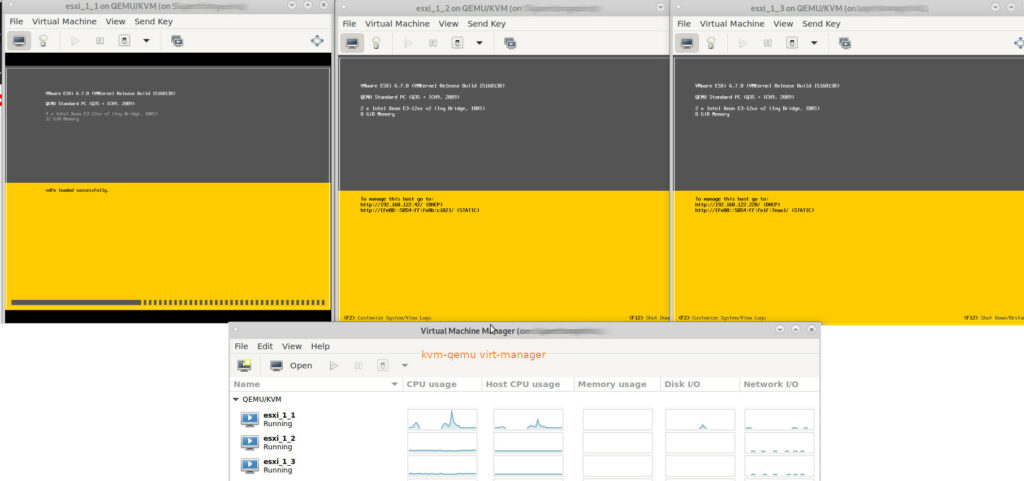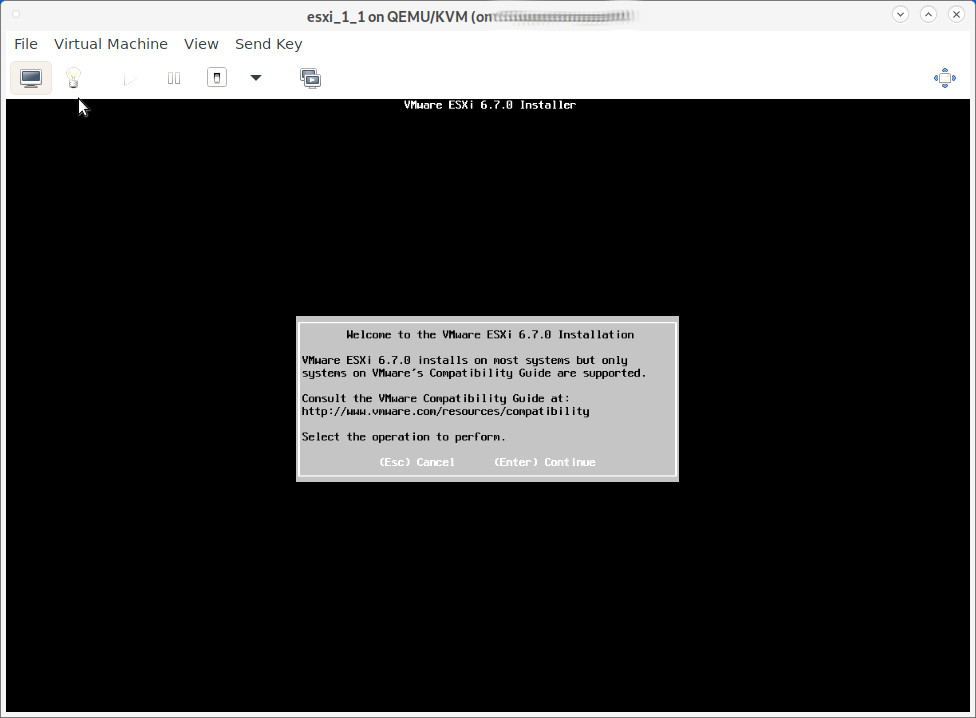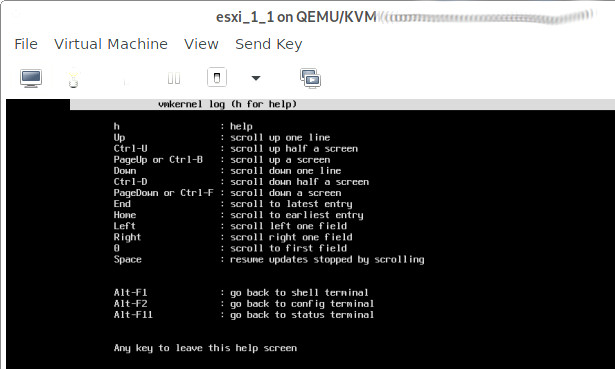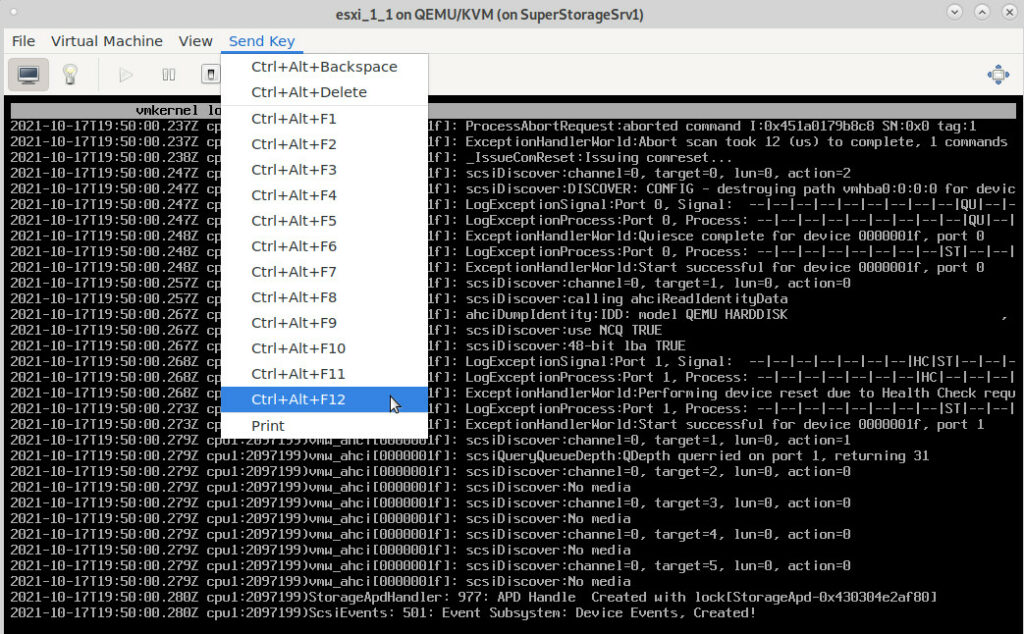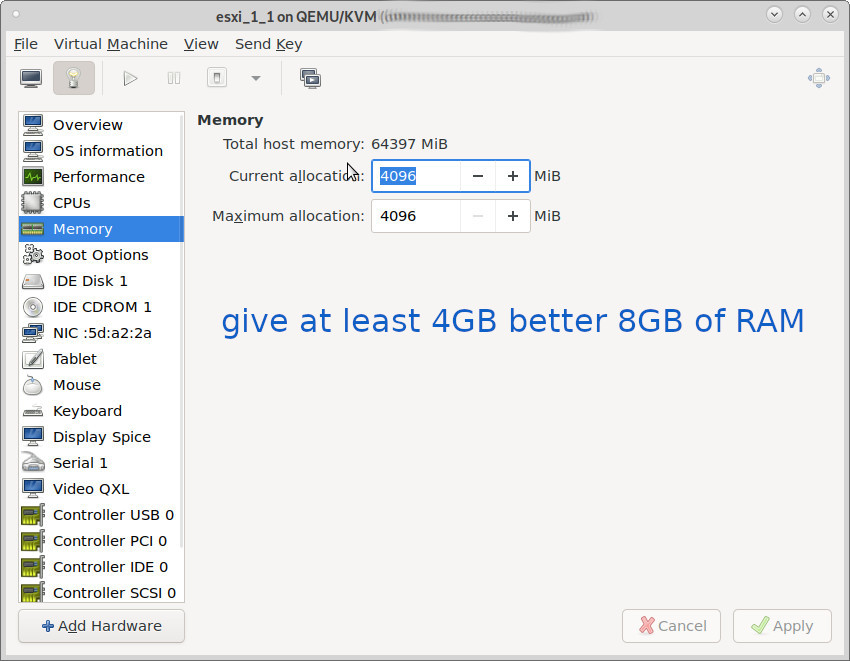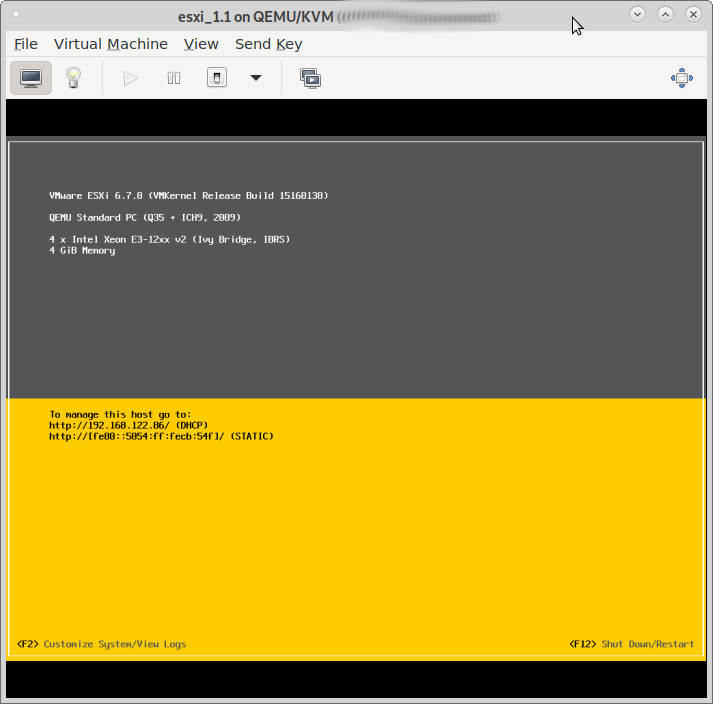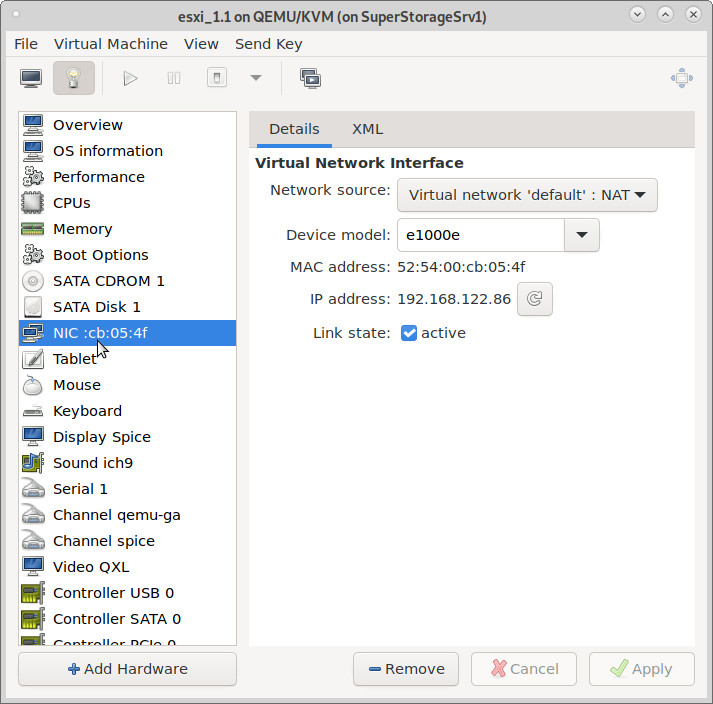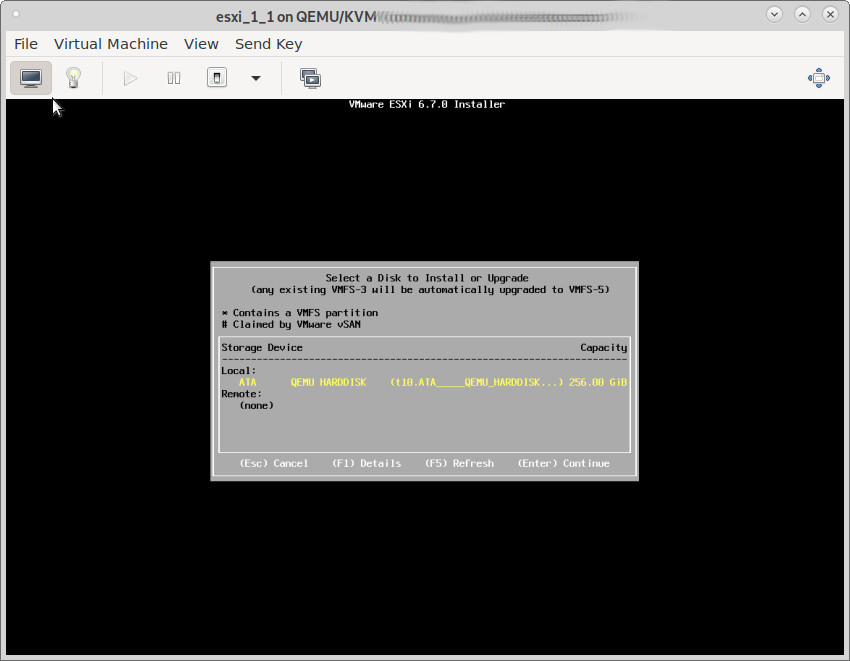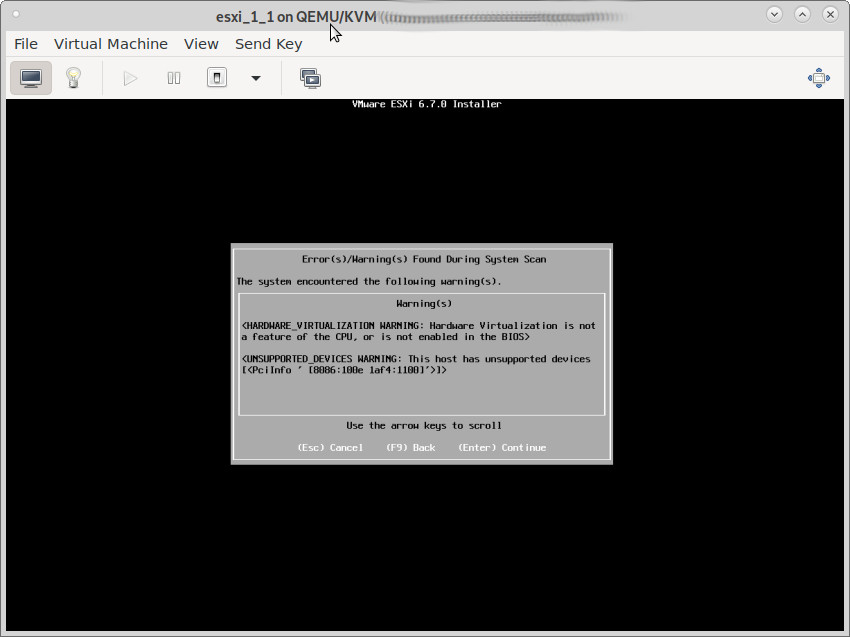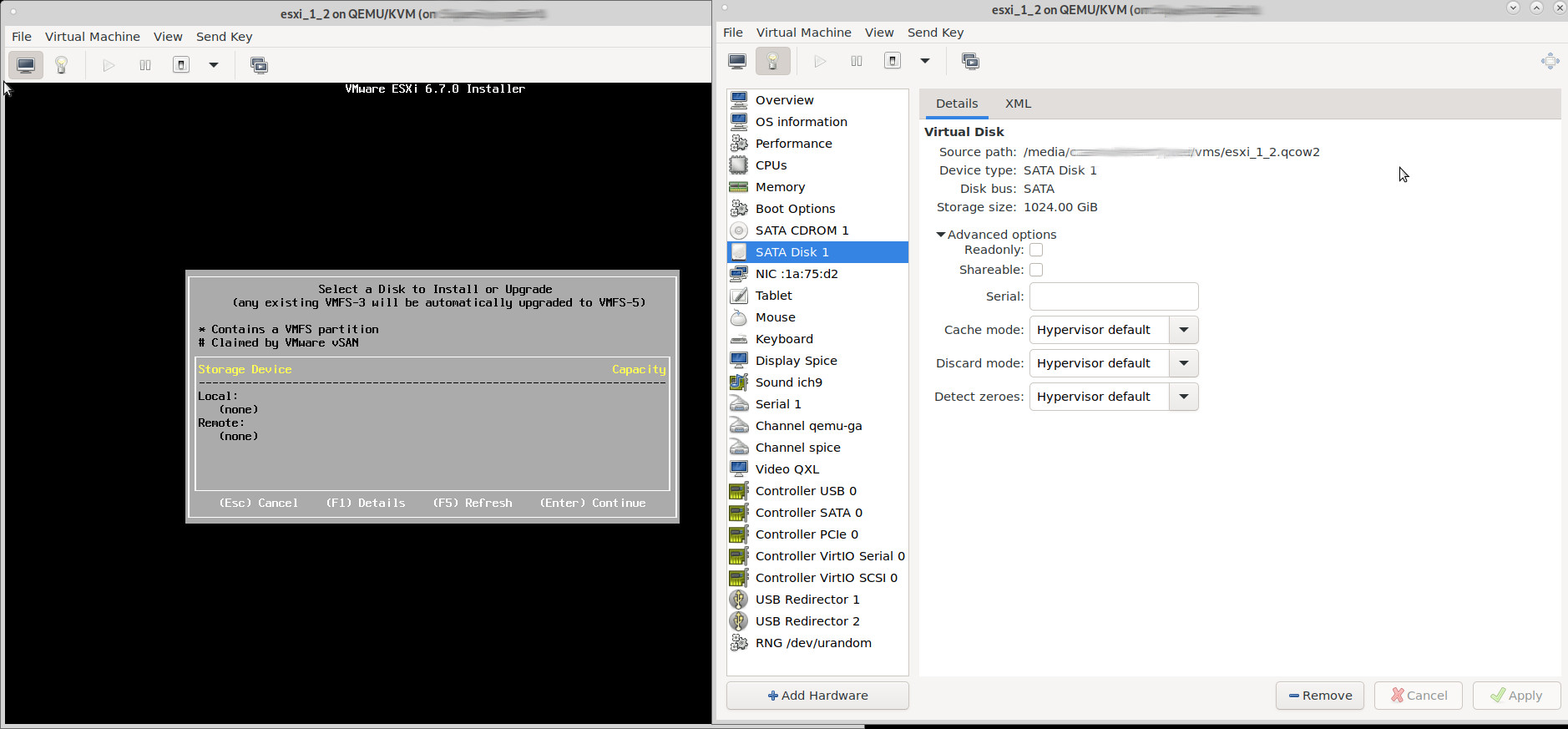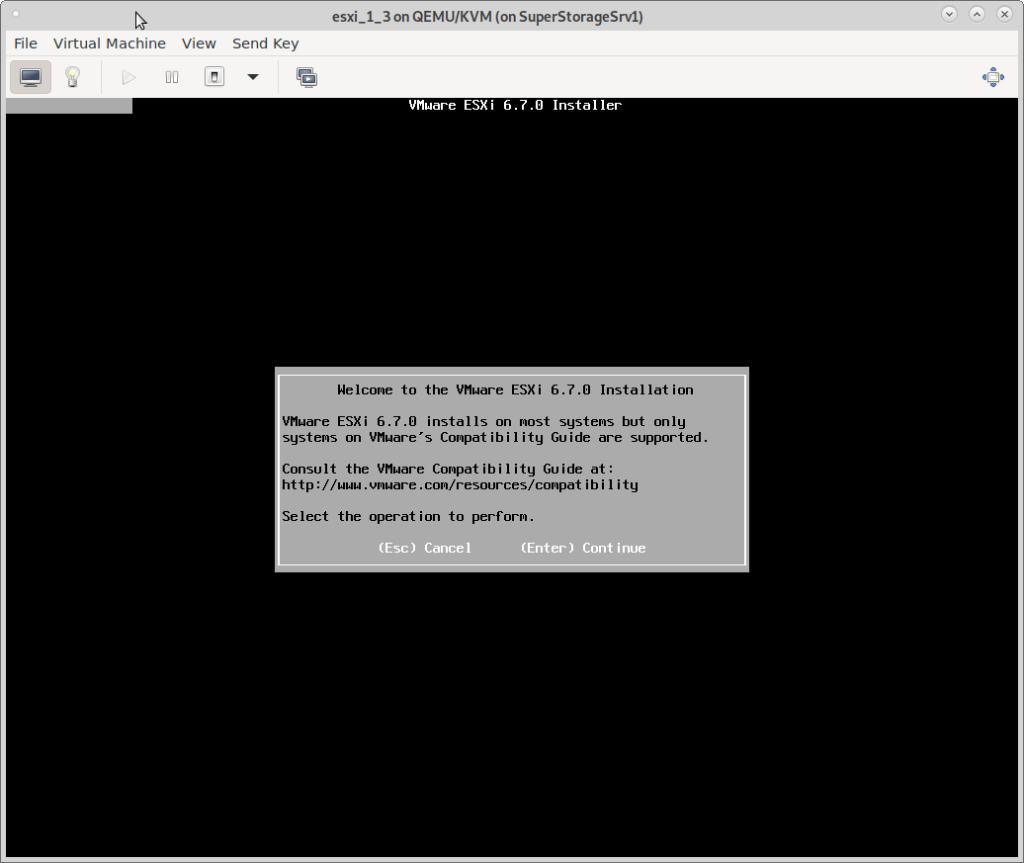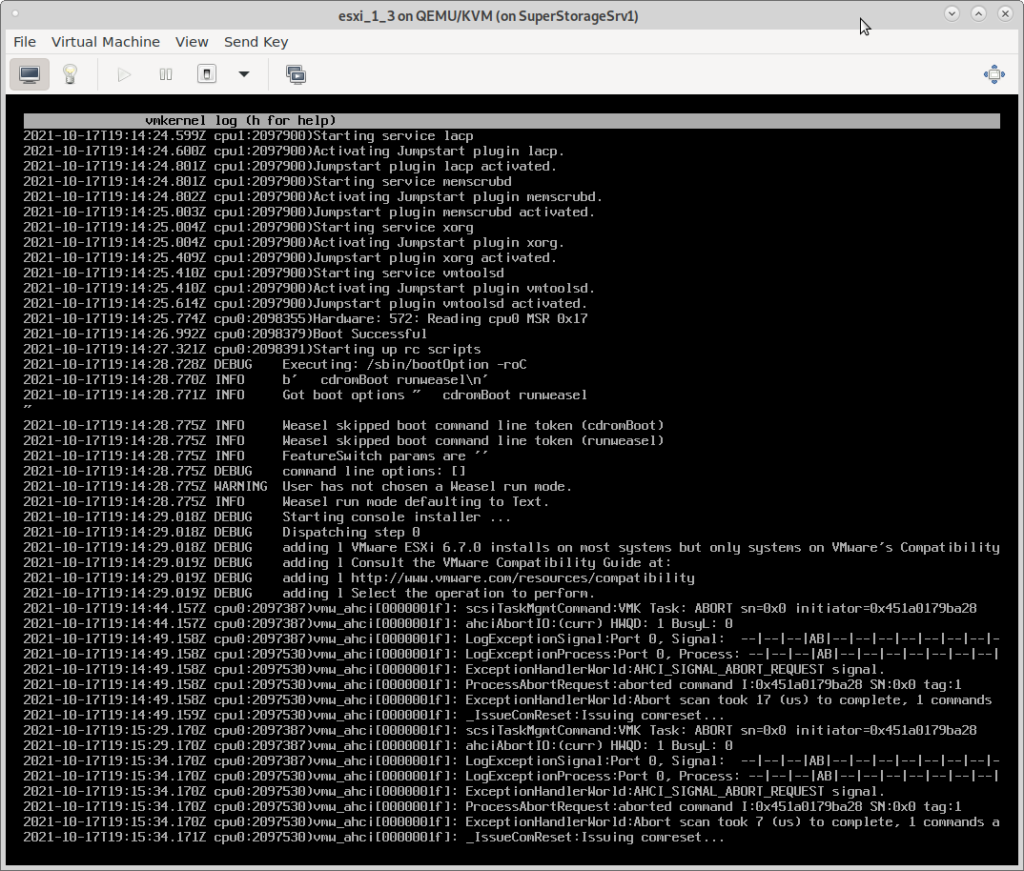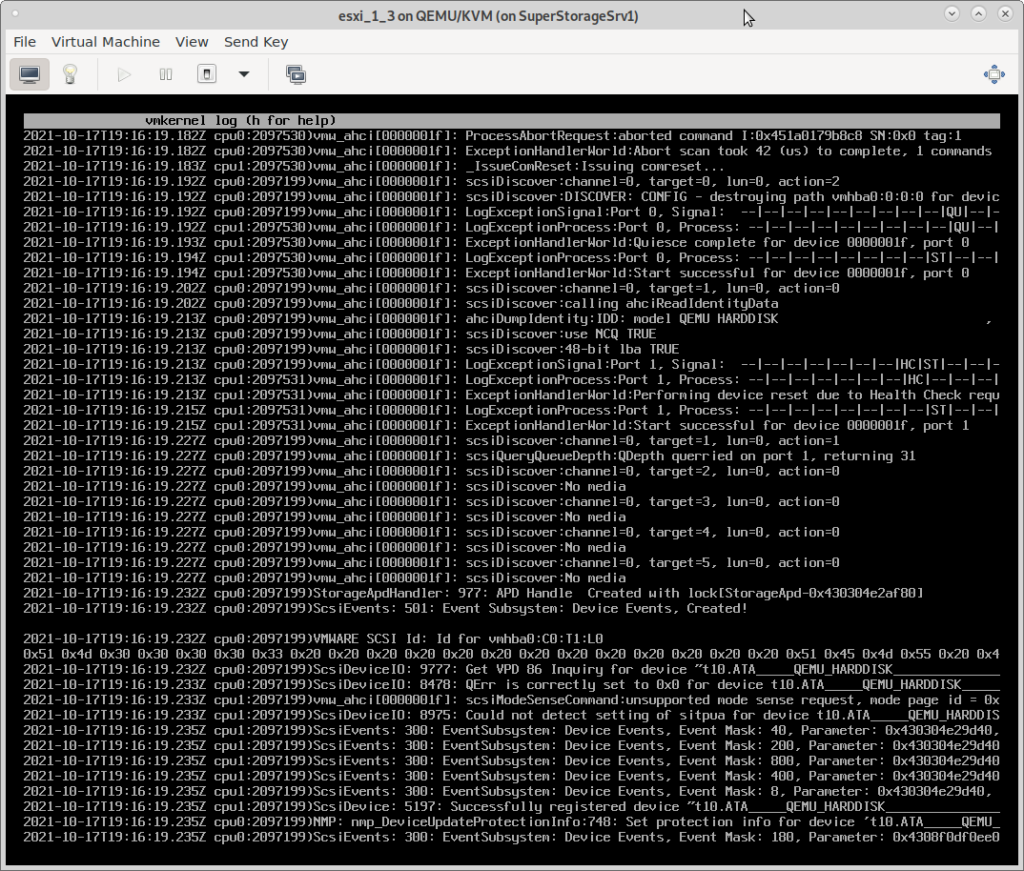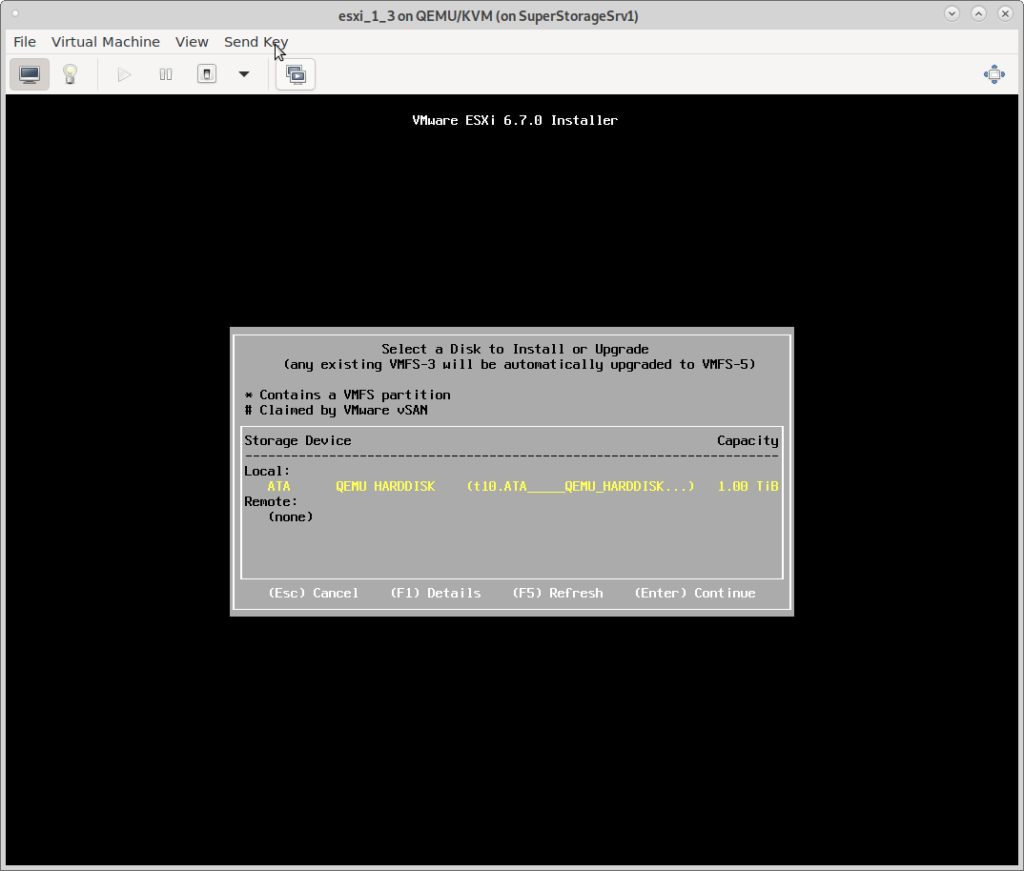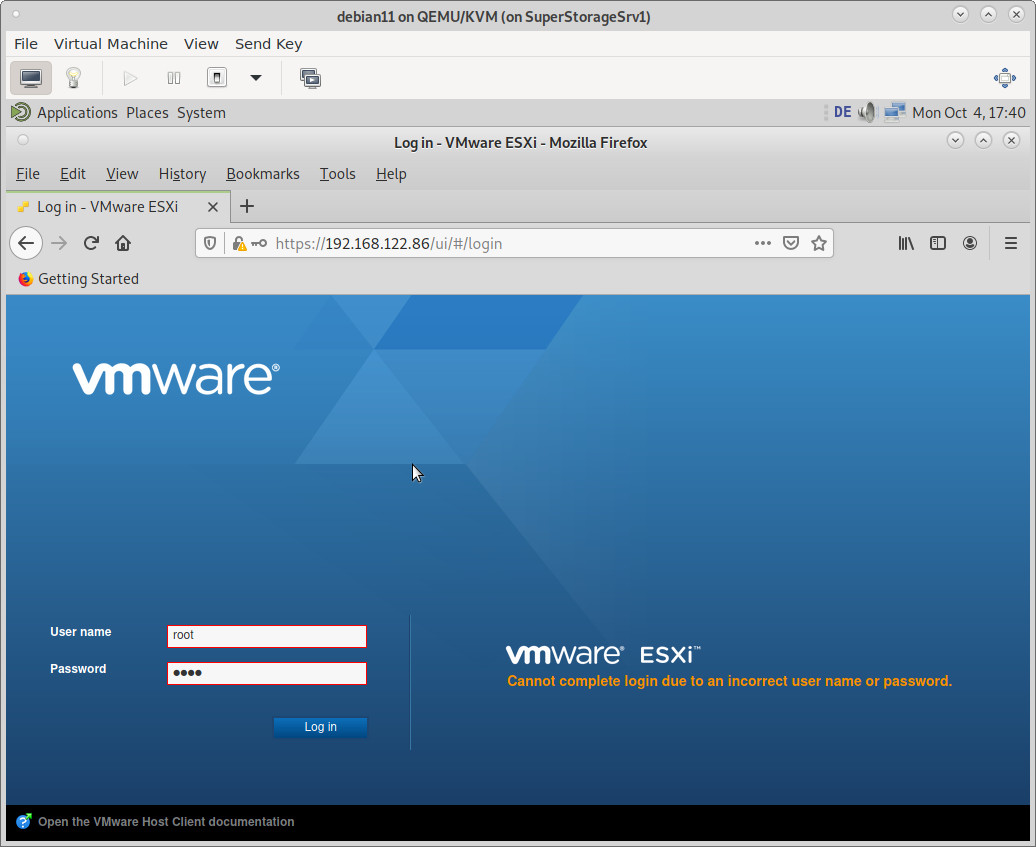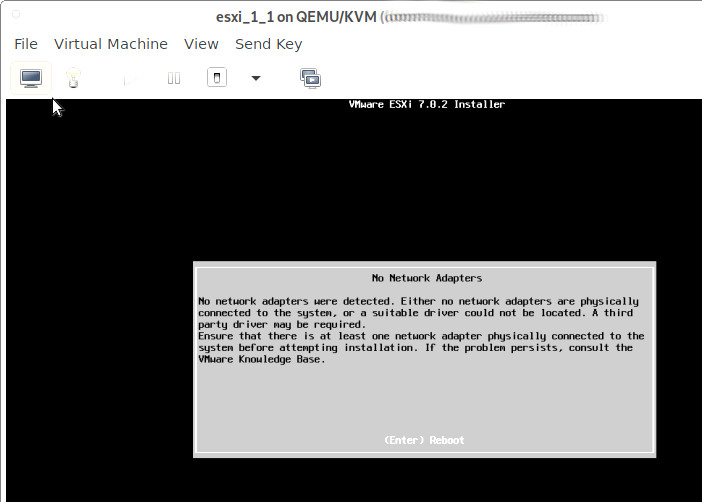let’s say: in theory – it works – in practice vmware and kvm (RedHat) would REALLY have to work together to make this work for real.
in reality – there are (currently) massive sata harddisk driver problems between esxi 6.7 and kvm-qemu’s virtual harddisk
admin-user know: esxi is hardware picky (Dell bought VMWare in 2004 so, “officially” only Dell servers are 100% supported, but many servers of other vendors (SuperMicro, HP) work too) and yes with a little tinkering, it esxi 6.7 can “work” nested within kvm-qemu (right now (2021-10 latest Debian, latest kvm-qemu, (will retest that on older hp machine with CentOS7)) only with Xeon CPUs and massive harddisk (driver?) problems, but on the net, someone made it work with AMD too), nested esxi 7.0 is work in progress…
here is a config that worked: esxi-6.7-nested-within-kvm-qemu-tested-config-vmname.xml.txt
basic setup of kvm-qemu on Debian:
https://dwaves.de/2020/12/05/gnu-linux-debian-10-how-to-install-kvm-virtualization-qemu-basic-virsh-commands/
esxi 6.7 setup:
vmware esxi within kvm-qemu – sb.v00 failed to decompress and admission check failed for memory resource – errors mean: need more RAM?
this is for homeLab testing, not recommended for production use, because: vendor will not give support.
ok it is experimental, but those strange error messages above could mean two things:
general help during setup: (what is missing here: Alt+F12 = the verbose debug log screen)
0. the right cpu for the job
SetupA) (works) SuperMicro + Xeon E3 (Ivy Bridge) + Debian 11 + esxi 6.7 (the software is the problem, not the hardware, aka storage controller (SATA) problems)
# with this hardware it runs just fine within esxi hostnamectl; # tested on host Operating System: Debian GNU/Linux 11 (bullseye) Kernel: Linux 5.10.0-8-amd64 Architecture: x86-64 head /proc/cpuinfo processor : 0 vendor_id : GenuineIntel cpu family : 6 model : 58 model name : Intel(R) Xeon(R) CPU E3-1270 V2 @ 3.50GHz stepping : 9 microcode : 0x21 cpu MHz : 1672.704 cache size : 8192 KB physical id : 0 dmidecode |less Manufacturer: Supermicro Product Name: X9SCI/X9SCA # run some checks # (not all are required to pass) # (those results are actual results for this setup) su - root get install cpu-checker kvm-ok INFO: /dev/kvm exists virt-host-validate QEMU: Checking for hardware virtualization : PASS QEMU: Checking if device /dev/kvm exists : PASS QEMU: Checking if device /dev/kvm is accessible : PASS QEMU: Checking if device /dev/vhost-net exists : PASS QEMU: Checking if device /dev/net/tun exists : PASS QEMU: Checking for cgroup 'cpu' controller support : PASS QEMU: Checking for cgroup 'cpuacct' controller support : PASS QEMU: Checking for cgroup 'cpuset' controller support : PASS QEMU: Checking for cgroup 'memory' controller support : PASS QEMU: Checking for cgroup 'devices' controller support : PASS QEMU: Checking for cgroup 'blkio' controller support : PASS QEMU: Checking for device assignment IOMMU support : PASS QEMU: Checking if IOMMU is enabled by kernel : PASS QEMU: Checking for secure guest support : WARN (Unknown if this platform has Secure Guest support) LXC: Checking for Linux >= 2.6.26 : PASS LXC: Checking for namespace ipc : PASS LXC: Checking for namespace mnt : PASS LXC: Checking for namespace pid : PASS LXC: Checking for namespace uts : PASS LXC: Checking for namespace net : PASS LXC: Checking for namespace user : PASS LXC: Checking for cgroup 'cpu' controller support : PASS LXC: Checking for cgroup 'cpuacct' controller support : PASS LXC: Checking for cgroup 'cpuset' controller support : PASS LXC: Checking for cgroup 'memory' controller support : PASS LXC: Checking for cgroup 'devices' controller support : PASS LXC: Checking for cgroup 'freezer' controller support : FAIL (Enable 'freezer' in kernel Kconfig file or mount/enable cgroup controller in your system) LXC: Checking for cgroup 'blkio' controller support : PASS LXC: Checking if device /sys/fs/fuse/connections exists : PASS egrep -c '(vmx|svm|ept)' /proc/cpuinfo # should be more than 0 24 # want Y to be returned cat /sys/module/kvm/parameters/ignore_msrs N # want N to be returned cat /sys/module/kvm_intel/parameters/enable_apicv N # want Y to be returned cat /sys/module/kvm_intel/parameters/nested Y # want Y to be returned cat /sys/module/kvm_intel/parameters/ept Y # (creditz: https://fabianlee.org/2018/09/19/kvm-deploying-a-nested-version-of-vmware-esxi-6-7-inside-kvm/)
1. not enough RAM! X-D
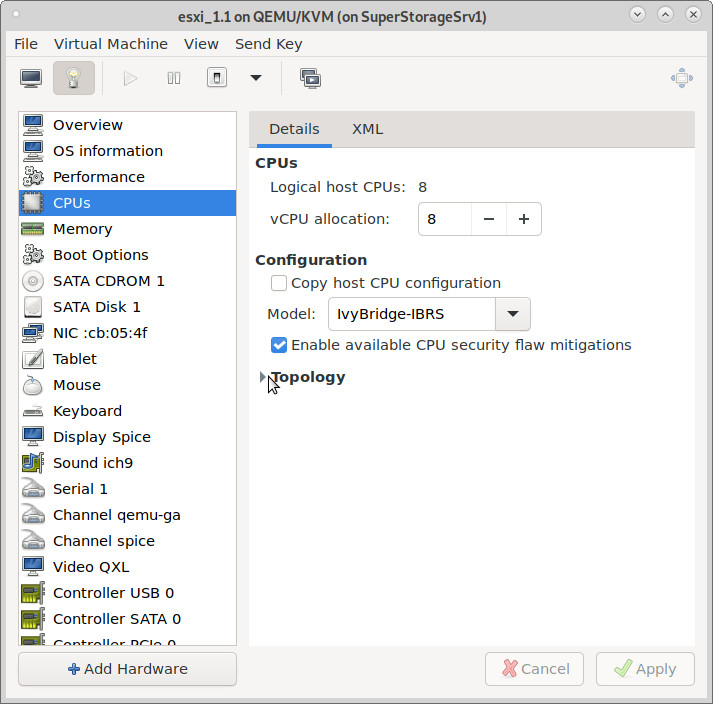
even when the checkbox “copy host cpu configuration” is set, this checkbox will automatically be disabled and “Enable available CPU security flaw mitigations” will automatically be enabled when vm is started. no worries.
SetupB) (would be super fast, but no functional (yet)) Asus + Ryzen 5 + NVMe
dmidecode | less Manufacturer: ASUSTeK COMPUTER INC. Product Name: Pro WS 565-ACE Version: Rev X.0x # would be cool if it worked with that NVMe enabled hardware head /proc/cpuinfo processor : 0 vendor_id : AuthenticAMD cpu family : 23 model : 113 model name : AMD Ryzen 5 3600 6-Core Processor (which translates for kmv-qemu to EPYC-IBPB) stepping : 0 microcode : 0x8701021 cpu MHz : 2566.794 cache size : 512 KB physical id : 0
For x86 guests there are 2 additional CPU flags associated with Spectre/Meltdown mitigation: spec-ctrl, and ibpb:
- spec-ctrl: exposes Indirect Branch Restricted Speculation (IBRS)
- ibpb: exposes Indirect Branch Prediction Barriers
src: https://www.qemu.org/2018/02/14/qemu-2-11-1-and-spectre-update/
# os used
hostnamectl
Operating System: Debian GNU/Linux 10 (buster)
Kernel: Linux 4.19.0-17-amd64
Architecture: x86-64
but then…. esxi 6.7 on kvm-qemu (Debian 10) OS: “Generic default” Copy CPU: “EPYC-IBPB” and 8GB of RAM
testing:
# if server is intel cat /sys/module/kvm_intel/parameters/nested 1 # if server is amd cat /sys/module/kvm_amd/parameters/nested 1
2. the picky harddisk controller problem
no harddisk found:
try this: stay at this screen for at least 10min… (Alt+F12 = watch the verbose debug output change as it detects)
1. actually starts detecting hardware BEFORE pressing enter
2. needs more time to detect hardware
wait for it…
dada!
hewego… X-D
thin-provision (bit slower but way smaller (dynamic growing) harddisk)
cat /scripts/kvm-qemu/harddisk_new_thin.sh #!/bin/bash PATH_VM="/where/vms/are/stored/$1.qcow2" if test -f "$PATH_VM"; then echo "... $PATH_VM hd file already exists, cancel process (otherwise will be overwritten)" else echo "... creating new thin provisioned virtual qcow2 harddisk with /path/name $PATH_VM and size $2GB ===" qemu-img
3. virtual network adapter e1000e works for exsi 6.7
4. a working vmname.xml config example:
sometimes it is easier to copy and paste a working config via xml editor which can be done inside virt-manager (click on xml) or directly from bash-terminal:
here is a config that worked: esxi-6.7-nested-within-kvm-qemu-tested-config-vmname.xml.txt
virsh edit vmname
the end result should be…
esxi 7.0: problems with virtual e1000
the newer version of esxi does not recognize the e1000 anymore 🙁
enable libvirt kvm qemu logging:
# to get a more verbose output combine setting this vim /etc/libvirt/libvirtd.conf # find and unquote those lines log_filters="1:qemu 1:libvirt 4:object 4:json 4:event 1:util" log_outputs="3:syslog:libvirtd" # no service needs to be restarted (?) "it just works" :) # fire up this one-liner (which works if tail does not have to process too much log files X-D) # without color but: you can scroll it :) find /var/log/* -type f \( -name "*" \) ! -path '*.gz*' -exec tail -n0 -f "$file" {} + # with color but no scroll :( (ccze is not available on all distros, but it is on CentOS7, Debian 9 to 11) find /var/log/* -type f \( -name "*" \) ! -path '*.gz*' -exec tail -n0 -f "$file" {} + | ccze
https://dwaves.de/2017/06/15/linux-monitor-all-logs-in-real-time-d-follow-all-show-changes-to-log-files-under-varlog/
# sample output ==> /var/log/debug <== Oct 17 18:13:26 SuperStorageSrv1 libvirtd[572]: unsupported configuration: IDE controllers are unsupported for this QEMU binary or machine type ==> /var/log/syslog <== Oct 17 18:13:26 SuperStorageSrv1 libvirtd[572]: unsupported configuration: IDE controllers are unsupported for this QEMU binary or machine type
can it work on AMD CPUs: Ryzen?
theoretically yes
AMD‘s naming (other than intel i3, i5, i7, i9…) is a bit confusing, but basically there is currently the Ryzen 5, 7 and 9
a nice benchmark online comparison site: https://cpu.userbenchmark.com/
currently leading the charts: Core i9-11900K, +5% faster than AMD Ryzen 9 5900X (src)
Zen core architecture (2017–present)
Zen-based CPUs and some APUs use the “Ryzen”-brand: List of AMD Ryzen microprocessors, while some APUs use the brand “Athlon”: List of AMD accelerated processing unit microprocessors.
Zen series CPUs and APUs (released 2017)
- Summit Ridge Ryzen 1000 series (desktop)
- Whitehaven Ryzen Threadripper 1000 series (desktop)
- Raven Ridge Ryzen 2000 APU series with RX Vega (desktop & laptop)
- Naples Epyc (server)
Zen+ series CPUs and APUs (released 2018)
- Pinnacle Ridge Ryzen 2000 series (desktop)
- Colfax Ryzen Threadripper 2000 series (desktop)
- Picasso Ryzen 3000 APU series with RX Vega (desktop & laptop)
Zen 2 series CPUs and APUs (released 2019)
- Matisse Ryzen 3000 series (desktop)
- Castle Peak Ryzen Threadripper 3000 series (desktop)
- Renoir Ryzen 4000 APU series with RX Vega (desktop & laptop)
- Lucienne Ryzen 5000 APU series (laptop)
- Rome Epyc (server)
Zen 3 series CPUs and APUs (released 2020)
- Vermeer Ryzen 5000 series (desktop)
- Cezanne Ryzen 5000 series (laptop)
- Milan Epyc (server)
src: https://en.wikipedia.org/wiki/List_of_AMD_processors#K8_core_architecture_(2003%E2%80%932014)
Links:
https://fabianlee.org/2018/09/19/kvm-deploying-a-nested-version-of-vmware-esxi-6-7-inside-kvm/
https://www.cloudgardens.eu/blog/vmware-esxi-running-under-qemu-kvm/
https://www.berrange.com/posts/2018/06/29/cpu-model-configuration-for-qemu-kvm-on-x86-hosts/
liked this article?
- only together we can create a truly free world
- plz support dwaves to keep it up & running!
- (yes the info on the internet is (mostly) free but beer is still not free (still have to work on that))
- really really hate advertisement
- contribute: whenever a solution was found, blog about it for others to find!
- talk about, recommend & link to this blog and articles
- thanks to all who contribute!


